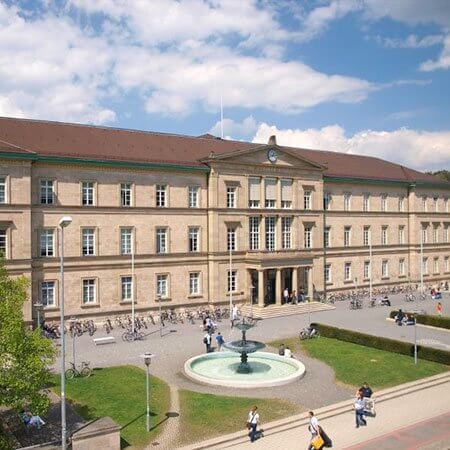Mammary gland cancer
Breast cancer is the most common malignant malformation in women. It is not only the most common tumor, but also the most common cause of the death from cancer. The incidence of this disease in the world is about 40 cases per 100.000 female population per year.
The Booking Health portal presents 61 German clinics specializing in mammary gland cancer treatment
Show all clinics
The incidence of breast cancer in developed countries increases. The reasons for the increase are:
- Decrease in the number of pregnancies per woman
- Rejection of the breastfeeding or its duration decreasing
- Increase in life expectancy (the number of older women grows, and the risk of developing breast cancer is higher with the age)
Nevertheless, due to the timely diagnostics and the latest methods of treatment, the mortality rate from this disease have been reduced by one third in recent years. It is very important to visit clinic regularly and receive a qualitative treatment.
Mammary gland cancer – Diagnostics
It is necessary to detected breast cancer at the early stage, when there are no symptoms. The main symptom of the disease is the presence of breast tumor formation. At first it is movable and then it is anchored to the surrounding tissues. With the help of modern diagnostic techniques the tumor may be detected when its diameter is under 0.5 cm.
The following methods are used for the detection of any possible formations in the breast:
- Self-examination (when woman independently palpates her breasts for prophylactic purposes)
- Medical examination (it is advisable to undergo it once a year in the middle age, in the old age it is better to visit a doctor every six months)
- Ultrasound examination
- Mammography (breast X-ray examination)
About 80% of patients visit a doctor with the complaints on the palpable formation in the breast. Seldom, the tumor is detected during the preventive examination or diagnostics of the other diseases.
Additional symptoms appear as the disease progresses. The most common (classical) clinical signs of breast cancer are:
- Changes in breast size (increase or decrease)
- Breast deformation
- Retraction of the skin in a limited area (“flattened skin” symptom)
- Retraction of the nipple
- Swelling and thickening of the skin on the breast area with visible sweat gland ducts on its surface ("lemon peel" symptom)
In case of Paget's cancer, there are cracks, indurations, and redness around the nipple. There are crusts which get wet and fall off. Granular surface appears instead. Subjectively, the disease is manifested with itching in the nipple area.
The following examinations are performed in order to confirm the diagnosis:
- Fine-needle aspiration biopsy (the breast tissue samples are taken and examined for the presence of atypical cells)
- Trepanobiopsy (a needle with a large diameter is used, it makes possible to estimate the amount of receptors to sex hormones in the tumor cells and a number of other parameters which influence choice of the therapeutic tactics)
Bilateral mammography is performed as a clarifying examination, allowing to estimate the size of the tumor and its location.
Best clinics for the mammary gland cancer diagnostics in Germany:
Mammary gland cancer – Treatment
Surgery is the main treatment method for the breast cancer. Other therapeutic techniques are used in combination with the surgery or instead of it, if there are any contraindications to the surgical treatment.
Sectoral resection, quadrantectomy. This type of intervention implies removing only particular areas of the mammary gland. It is used in case of a small tumors (2-3 cm), which are not anchored to the surrounding tissues. It should necessarily be combined with radiation therapy for the residual breast tissue.
Organ-preserving surgeries are not performed if:
- The tumor is larger than 5 cm
- Tumor grows into the surrounding tissues
- Mammography detected diffuse induration in the breast
- There is no possibility to carry out a qualitative radiation therapy after surgery
- There are more than one tumor
- The disease is accompanied by an inflammatory process
- The tumor has no clear boundaries
- A woman is pregnant
- A male person has breast cancer
Radical mastectomy is a removal of the entire breast, subcutaneous fat with the lymph nodes and pectoralis minor muscle. Sometimes pectoralis major muscle is also removed.
Radiation therapy is used as an addition to the surgical treatment in order to reduce the risk of disease relapse.
Chemotherapy. It is very likely that the tumor has metastases by the time the diagnosis is established, even if the cancer was diagnosed at an early stage. Chemotherapy is prescribed in order to suppress the growth of the metastases.
Not only the survival rate and absence of tumor relapse, but also appearance are very important for the young and middle-aged women. Therefore, the reconstructive surgery is often performed after the breast surgery. Breast reconstruction after mastectomy can be performed with the patient’s own tissues or with the implants.
Mammary gland cancer – Innovative treatment
New methods of breast cancer treatment are gradually introduced. They significantly prolong patients' life expectancy, even at the later stages of the disease.
Targeted therapy. Drugs that selectively influence cancer cells are used. At the same time, the division of normal cells is practically not inhibited.
HER-2 positive cancer presupposes the implementation of the monoclonal antibodies (Trastuzumab, Pertuzumab). These drugs showed the high efficiency during the clinical trials for the metastatic mammary gland cancer, both in monotherapy and in combination with chemotherapy. Latest medications, such as Palbociclib and Everolimus are used for the targeted therapy of the HER-2 negative hormone-dependent mammary gland cancer. They selectively inhibit the tumor growth by blocking the proteins that contribute to the accelerated division of the tumor cells.
Angiogenesis inhibitors are the new group of drugs for mammary gland cancer treatment. The purpose of these medications is to inhibit the new blood vessels growth that impoverishes feeding of the tumor.
Oncoplastic surgery. Not only effectiveness of the surgery, but also her appearance after the treatment completion, is important for every woman. Operations are gradually introduced into medical practice, when simultaneously with the removal of the mammary gland fragment an intervention on the other breast is performed. The purpose of such surgeries is to preserve the same shape and size of the both breasts.
Best clinics for the mammary gland cancer treatment in Germany:


Mammary gland cancer – Rehabilitation
Most patients require rehabilitation after the treatment of complex oncological diseases. It includes the following aspects:
- Prevention of complications that may occur as a result of treatment. It can be pneumonia, lymphostasis, thromboembolic or infectious complications.
- Restoration of general health. The elimination of the consequences after surgeries and chemotherapy is carried out. The functions of internal organs are restored with the help of various medical and rehabilitation measures.
- Restoration of occupation. A person must not just stay alive. He must have physical and intellectual capabilities, which are sufficient for employment.
- Psychological support. First of all, it is required for patients, whose occupational performance was harmed because of the disease. Patients with deterioration of appearance also will benefit from psychological help.
- Restoration of appearance. If necessary, you can use surgical and other methods in Germany to restore appearance defects caused by cancer. For example, to carry out the reconstruction of the breast.
- Social and domestic rehabilitation. A person with reduced workability is trained to act in the society and perform everyday tasks in new conditions.
In German clinics, rehabilitation is carried out in a comprehensive manner. The patients are provided with qualitative care here. Doctors' monitoring and conservative treatment allow to avoid complications, which usually happen after treatment of oncological diseases. Psychotherapy, physiotherapy and physical therapy are actively used in Germany.
Specialists in different medical spheres take part in the rehabilitation process. These are massage therapists, speech therapists, specialists in physiotherapy exercises, physiotherapists. Social and occupational therapy is carried out, as well. If necessary, people are taught how to eat properly, take care of the postoperative scar etc.
In Germany, rehabilitation is carried out with the maximum level of comfort for the patient. A person feels the results quite quickly and it improves his motivation and promotes further recovery.
Best clinics for oncological rehabilitation in Germany:
Author:
The article was edited by medical expert, board certified Dr. Nadezhda Ivanisova. For the treatment of the conditions referred to in the article you must consult a doctor; the information in the article is not intended for self-medication!
Sources:
Centers for Disease Control and Prevention
The cost of services includes
Here you can find the cost of treatment for this disease at the German University Hospitals. Leave a request and we will provide a free consultation with a doctor and will start organizing the whole treatment process.
The program includes the following:
- Issuing of an invitation for getting a visa for treatment as quick as possible
- Fixing an appointment at a time convenient for you
- Preliminary organization of a comprehensive examination and discussion of the forthcoming treatment plan
- Arranging transfer from the airport to the hospital and back to the airport
- Provision of interpreting services and services of a personal medical coordinator
- If necessary, assistance in the organization of further surgical treatment
- Provision of a medical insurance against treatment complications covering up to 200,000 euro
- Preparation and translation of medical records and recommendations from the hospital
- Assistance in the subsequent communication with your attending physician, including consultations on repeated X-ray images through the unique medical document management system E-doc




